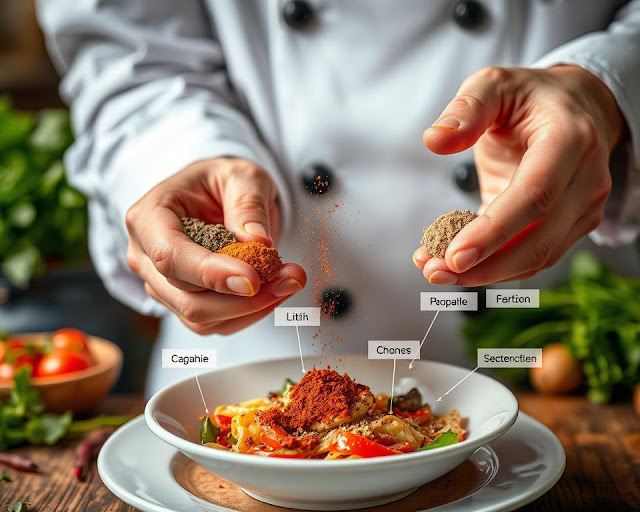Imagine every dish you make full of complex flavors that amaze your guests. Can the average home cook achieve this? Yes, learning seasoning secrets can change your cooking and boost your skills. But what are these secrets, and how do you learn them?
Key Takeaways
- Discover the essential spices and herbs that professional chefs rely on for flavor-packed dishes
- Learn how to balance flavors like a pro, creating harmonious and satisfying meals
- Explore the diverse global influences that can inspire your seasoning repertoire
- Understand the fundamentals of seasoning, from the role of salt and pepper to building complex spice blends
- Unleash your creativity and confidence in the kitchen by mastering the art of seasoning
Understanding Seasoning Basics
Seasoning is key in the kitchen, unlocking a world of flavors. Essential spices and the classic mix of salt and pepper are crucial for every cook. Let's dive into the basics that make flavors pop.
Exploring Essential Spices and Herbs
The spice rack is full of options to boost our meals' flavors. Spices like cumin, paprika, and cinnamon can change a dish's taste. They bring unique smells and tastes. Herbs like basil, thyme, and rosemary add freshness and depth to simple dishes.
Salt and Pepper: The Dynamic Duo
Salt and pepper are vital in seasoning. They balance and enhance food's natural tastes. Salt boosts other flavors, while pepper adds a subtle kick. Getting the right mix of these two is key to tasty meals.
Knowing about essential spices, herbs, salt, and pepper lets cooks try new flavor mixes. This opens up a world of tasty possibilities in the kitchen.
"Seasoning is the difference between a good dish and a great one." - Anonymous Chef
Mastering Seasoning Secrets
Seasoning is a key skill for chefs, and it can make your cooking stand out. By learning how to balance flavors and use spices and umami boosters, you can make your dishes taste like they're from a restaurant. It's all about seasoning at every step of cooking.
Balancing Flavors Like a Pro
Getting the flavors just right is what makes a home cook great. It's about knowing how sweet, sour, salty, bitter, and umami work together. By mixing these tastes, you can make your food more interesting and tasty.
Start with a strong flavor base by seasoning your main ingredients with savory spices and umami boosters before cooking. This gives your dish a solid taste that you can adjust later.
- Try adding a bit of acid (like lemon juice or vinegar) to brighten rich dishes.
- Use seasoning techniques like toasting spices or blooming them in oil to bring out their aromas.
- Add umami boosters like soy sauce, Parmesan, or mushrooms for a deep savory taste.
With practice, you can turn simple ingredients into amazing dishes by balancing flavors well.
"The secret to great cooking is not found in complicated recipes, but in the mastery of basic techniques and the understanding of flavor."
- James Beard, renowned American chef and food writer
Global Seasoning Influences
The world is full of different cooking traditions. Each one has its own special flavors. As home cooks, we can explore these flavors and add them to our dishes.
Imagine walking through spice markets in India or finding fresh herbs in a Mediterranean kitchen. The world of ethnic seasonings and global flavor profiles is vast. By learning about these natural flavor boosters, we can make our cooking better and go on a tasty journey around the world.
Think about the warm taste of cumin, common in Latin American and Middle Eastern food. Or the bright taste of lemongrass, loved in Thai and Vietnamese cooking. Trying out these global flavor profiles can make us try new ingredients. It can also make our favorite recipes more exciting.
"Seasoning is not just about adding flavor; it's about unlocking the hidden potential in every dish, revealing the true essence of the ingredients."
Exploring ethnic seasonings shows us that seasoning is more than just salt and pepper. It's about finding unique smells and natural flavor boosters that take us to far-off places. With just a spice jar, we can travel the world through our food.
If you love cooking or are just starting, exploring global flavor profiles can be exciting. It opens up new ways to cook. So, let's start a tasty journey, one spice at a time.
Conclusion
As we wrap up this exploration of seasoning, it's clear that it's a key to changing home cooking. By learning about spices, herbs, and flavor balance, cooks can improve their skills. This opens up new possibilities in the kitchen.
This article has given readers the knowledge to try new seasoning mixes. It encourages creativity and helps make dishes that wow others. Whether you're an experienced chef or just starting, these seasoning tips will inspire you to try new things in your cooking.
Seasoning is more than just a way to season food. It's a way to create your own culinary art. Use seasoning to take your cooking to new heights of taste, happiness, and self-expression. There are so many possibilities, so start exploring and see what you can do in your kitchen.




Post a Comment